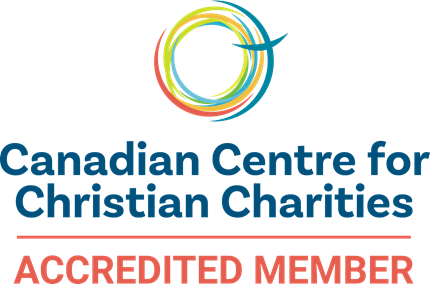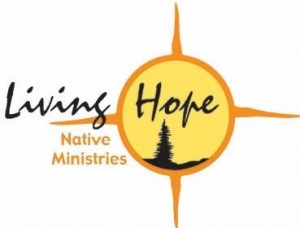
Hopelines
A quarterly publication presenting news and stories of Living Hope Native Ministries, a partnership dedicated to serving the First Nations of Ontario.
Current Ministry Opportunities
Current ministry opportunities are open in various locations in Ontario. If you are hearing God's call to any of these areas, please contact the LHNM office so we can share more information with you.
- Youth ministry
- Strengthening and co-leading community churches
- Teaching Bible classes and other children's ministry
- Graphic design and communication
- Akwachink Leadership School leader in training
Our Vision
That in every First Nations context the local church would reach its full potential--worshipping in full devotion, attracting the seekers, mobilizing believers, restoring families, changing communities, affecting the world.
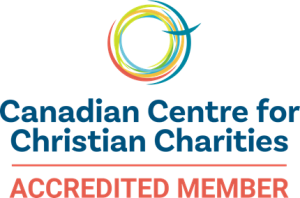
A Journey from Blindness
By Stuart Swartzentruber
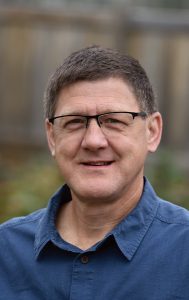 The discovery of unmarked graves at former residential school sites has brought horror and grief to many in Canada. There is also a certain kind of vindication for the residential school survivors who have spoken of atrocities at some schools for many years.
The discovery of unmarked graves at former residential school sites has brought horror and grief to many in Canada. There is also a certain kind of vindication for the residential school survivors who have spoken of atrocities at some schools for many years.
I am non-Indigenous, but help lead an organization that is owned and controlled by a majority Indigenous board. I grieve for the loss and the pain that the residential school system brought to Indigenous people in Canada. I grieve that LHNM’s historic connection to organizations that operated a residential school still causes pain. I grieve that I participated in a government funded system designed to destroy Indigenous culture. I grieve for the students and friends that encountered pain and loss at Poplar Hill Development School where I worked. I am trying to learn how to walk in humility and repentance in regards to those years of my life.
God is slowly opening my eyes to my cultural arrogance, and to the way I view the world and people around me. The journey from blindness is a life-long process, and I still have a long ways to go.
In the story of a blind man receiving his sight in Mark 8:22-25, Jesus heals through an interesting process. Look at the following process points. Can you see yourself in any of these?
- Jesus led the blind man outside the village. Jesus takes us out of our safe places and comfort zones and begins exposing our flawed and sinful systems.
- Jesus took the blind man by the hand. Holding tightly to the hand of Jesus is the only safe stance to be in as God opens our eyes.
- Jesus spit on the blind man’s eyes. The journey from blindness is one of personal and cultural humility.
- Clear sight wasn’t immediate. The sight that Jesus brings is a lifelong process.
- The blind man eventually saw everything clearly. God’s kingdom will one day inhabit the whole universe. Everything will be made clear.

Abandoned building at a former residential school.
We all come to Jesus with a cultural bent that has a tendency toward pride. We need to leave our safe places and go outside our “towns”. We must allow Jesus to “spit in our eyes” and to transform that “spit” into a healing balm. Entering and living in another person’s world is a good place to start this journey.
In this edition of Hopelines, we rejoice that God is raising up workers. The stories of the Kirkpatricks and the Thorntons, and their desire to learn and be led by Jesus, are encouraging. We are praying with the church at Whitefish Bay, and asking that God will raise up the right workers for that community. How may God be calling you to move out of your comfort zone?
Living Hope Native Ministries wants to walk in humility and lament as we acknowledge our connection to the Residential School era. You can see LHNM’s Residential School apology statement on our website at www.lhnm.org/truth-and-reconciliation.
Walking Together in Thunder Bay
By Jeff and Mary Kirkpatrick
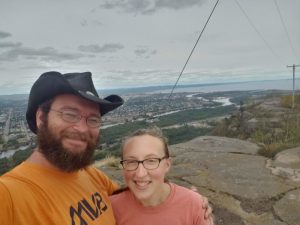
Jeff and Mary Kirkpatrick overlooking Thunder Bay from Mount McKay
We came to work with LHNM in Thunder Bay because we knew there was a need that we could help to fill. We lived in Pennsylvania but had been familiar with LHNM for a while; Jeff had participated in several short term VBS teams, and Mary had worked at Sandy Lake for a year. She was still maintaining the LHNM website, and had repeatedly posted the request for an office person in Thunder Bay--while praying that God would send someone.
In 2020 Stuart reached out to see if we wanted to help with a local event, and in the process we realized that LHNM was willing to hire people from the United States! The office position is what got the whole process started, but we are here as ministry workers. We are both the kind of people who love to help others. We teach, we encourage, and sometimes our boys even help mop the floor.
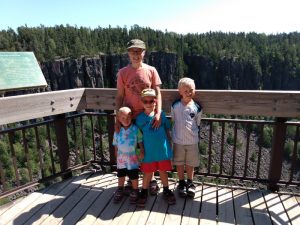
Mary and her sons exploring their new surroundings.
There are ministry opportunities everywhere, and Thunder Bay has plenty, too! We particularly look forward to partnering with some of the other organizations in Thunder Bay that are making earth look a little more like heaven, starting with New Hope Fellowship Church and the Youth Centre. We love that the church has people from all over the world--just like heaven!
One of the things that sets LHNM apart is the importance of partnership. We didn’t come to Thunder Bay with the answers to people’s problems. Life is not that simple, and in the long run that is not helpful. What do we know about people from a different culture? We can only testify to how God has changed our lives and watch and see how he changes theirs, because it’s not going to look the same.
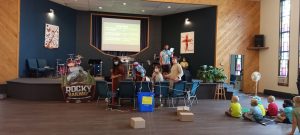
VBS 2021 at New Hope Fellowship.
We have no reservations about being part of an organization that focuses on building relationships that show the gospel through humility, service, and learning from one another. There is a solid group of First Nations believers in Thunder Bay and, just like we came to help in the office, we want to work together with them. Relationships with Jesus and with one another are the solutions to the problems of depression, suicide, and addictions in our communities.
We see God at work through LHNM and in Thunder Bay and it is our privilege to be a part of it!
Pastoral Opening in Whitefish Bay
By Sarah Capay

Sarah Capay and other community members visiting by the church.
Whitefish Bay is a community of approximately 175 people, and is one of three communities which comprise Lac Seul First Nation. It is accessible by paved road. The community has a Christian school which was established in 1993 using the Accelerated Christian Education curriculum, and is still in operation. Next to the school is the community complex, which is then by the community church.
The church was built in 1996 and has had an extension added onto the sanctuary. This extension has three bedrooms, small living room, kitchen and two bathrooms with shower stalls. The roof of the church was renovated this summer, and other renovations such as a deck and storage shed are continuing. The sanctuary has baseboard heaters, and also a wood-burning stove that has been in use throughout the years. There is a sound system, musical instruments, TV, padded chairs, and carpet throughout the sanctuary. The foyer will be under construction, along with a new entrance door.
Before the pandemic, we had church services at 11 a.m. on Sundays, Sunday school, social gatherings, Bible Study, weddings, and hosted funerals, Christmas plays, Summer Bible School and other events.
We started out in 1993 with the Christian school with a pastor and his wife, and then the building of the church followed. There have been four couples who have pastored the community church since it was built. The church has not had a full time pastor in quite a few years, but the believers continue to gather.
We would like to have a full-time pastor to lead and guide the church body and community. The Christian school has been a wonderful influence to the community throughout the years, but there is a need for leadership in the body of Christ. With the support of the church body, our desire is for the community to find hope and restoration for spiritual needs, and experience God who can help them better their lives.
Sarah Capay is a community and church elder in Whitefish Bay.
New Connections in Parry Sound
By Jamie Thornton

Jamie and Rhonda Thornton are preparing for full-time ministry after his retirement this fall.
Over the years I’ve enjoyed following the Living Hope Native Ministries (LHNM) website and looked forward to receiving the Hopelines newsletter in the mail. Rhonda and I feel blessed and humbled to be able to share our calling to serve with you in this issue.
Where we live in Parry Sound, Ontario there is only a swing bridge separating the town from Parry Island (Wasauksing First Nation). When I started school in the mid 60’s many of the students from Wasauksing were bused to Isabella school where I attended and many friendships where formed. I’ve always had a special place in my heart for our First Nations neighbours.
I like to say I had a “road to Damascus” experience on my 48th birthday, 12 years ago. I was saved very miraculously from the dark, broken, sin-filled life I was living. Up until that point I had used and abused many things that only the enemy would call good. I lived that lifestyle for a long time, and can relate to some of the struggles and strongholds that my First Nation friends and their families deal with in everyday life. I feel a great need to share the grace, love, forgiveness and understanding that the Lord has shown me, and the hope I now have in Jesus. Rhonda is a Metis woman, which also gives her a deeper understanding of the context where we’ve been called.
From where we live on the shore of Georgian Bay, we can drive 45 minutes north to Henvy Inlet First Nation or drive 45 minutes south to Wahta Mohawk Territory, and visit a total of six First Nations communities, not to mention numerous other First Nations communities in the North Bay, Sudbury and Manitoulin Island areas. There we have close associates working alongside Kevin and Norma Moore, and the Sudbury First Nations Church leaders.
I find it sad and unsettling that our First Nations people fall into the category of the world’s “least reached,” if not “unreached” people groups. We feel the great need to serve our First Nations right here at home in Ontario/Canada. The need is great, and the workers are few.
Throughout our 7-8 years in camp ministry we’ve always had a heartwarming relationship with Merle and Rita Nisly, Stuart and Delores Swartzentruber and their family, along with the Sudbury First Nation Church family. We’ve always had a great respect for LHNM, and the work to which the Lord has called them.
We feel the Lord’s hand and leading at this time as I look to retirement from my day job, and our full-time missionary calling alongside and under the leadership, wisdom and experience of LHNM.
Behold, I will do a new thing, now it shall spring forth; shall you not know it? I will even make a road in the wilderness and rivers in the desert. (Isaiah 43:19)
Bible Teacher Mount McKay Parry Sound partnership Residential school Thunder Bay Whitefish Bay
